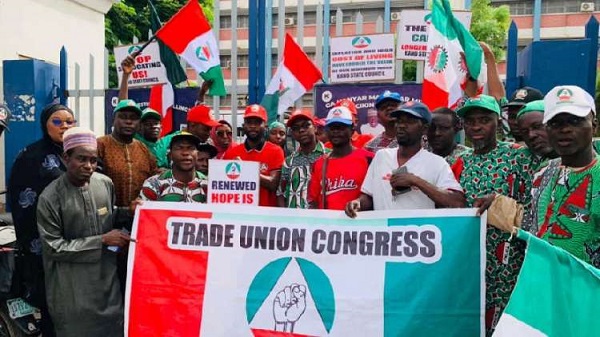BY BONNY AMADI
Nigeria’s new tax levy on purchase of petroleum products which attracts 5 percent tax, has received wide condemnation as in line with the tradition of the federal government unwritten policy, to always instil more hardship on the citizenry.
The tax levy has, however, raised concerns that the provision could trigger further hardship on Nigerians.
The Trade Union Congress of Nigeria (TUC), meanwhile, has rejected the federal government’s proposed 5 percent tax on petroleum products, describing it as “economic wickedness” against already overburdened Nigerians.
In a statement on Monday, Festus Osifo, TUC president general, and Nuhu Toro, secretary general, said the levy would further worsen hardship at a time when citizens are still grappling with the impact of petrol subsidy removal, high food prices, and a weakening naira.
“Let it be clear: workers and citizens are still reeling from the pains of subsidy removal, skyrocketing fuel prices, food inflation, and a collapsing naira.
To now introduce another levy on petroleum products is to deliberately compound suffering, cripple businesses, and push millions of citizens deeper into poverty,” the statement reads.
“Government cannot continue to use Nigerians as sacrificial lambs for its economic experiments. In- stead of offering relief, jobs, and solutions, it has chosen to further squeeze citizens dry. This is unacceptable!
“The TUC hereby urge the Federal Government to im- mediately stop this anti-people’s plan in its entirety. Failure to do so will leave us with no option but to mobilize Nigerian workers and the masses for a total nationwide resistance. Strike action is firmly on the table if the government dares to ignore this warning and go ahead to implement this policy.”
The TUC leaders instructed their state councils, affiliates, and structures across the country to stay alert and await further directives, which could lead to decisive action if the government chooses to disregard the people’s collective will.
They also called on civil society groups, professional bodies, student unions, market associations, and faith leaders to stand in solidarity with the union to resist “policies that seek to further impoverish citizens and mortgage our future”.
“Enough is enough. Nigerians deserve economic justice, not endless punishment,” the union leaders added.
Meanwhile, Nigeria’s new tax law imposed a 5 percent surcharge on chargeable fossil fuel products.
According to the Tax Act, a fossil fuel product becomes chargeable upon the earliest occurrence of supply, sale, or payment.
The tax levy has, however, raised concerns that the provision could trigger further hardship on Nigerians.
Providing clarifications on September 6, the Presidential Fiscal Policy and Tax Reforms Committee said the 5 percent fuel surcharge in the new tax laws is not a new levy introduced by the administration of President Bola Tinubu.
The committee said the surcharge has existed since the Federal Roads Maintenance Agency (Amendment) Act, 2007, and was only restated in the new tax act for harmonisation and transparency.













